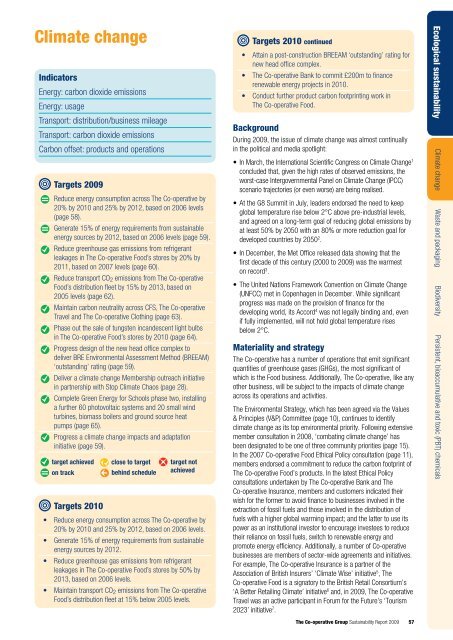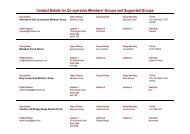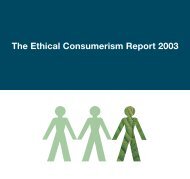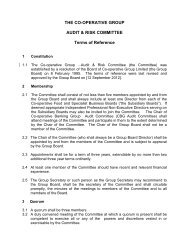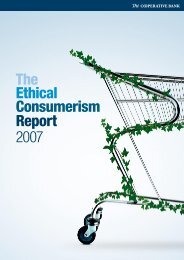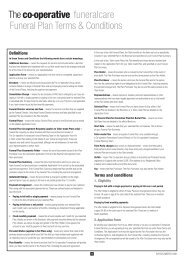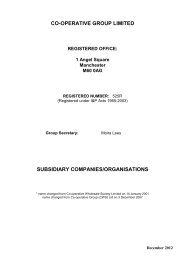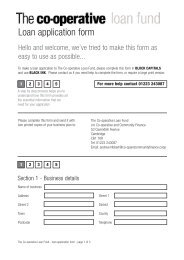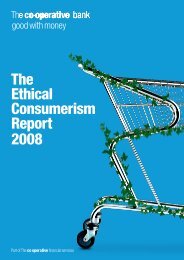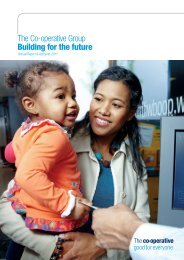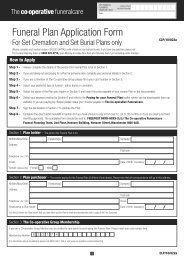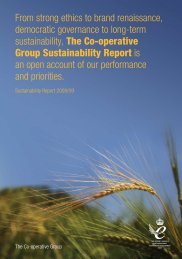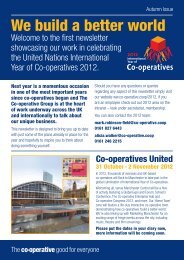Sustainability Report 2009 - The Co-operative
Sustainability Report 2009 - The Co-operative
Sustainability Report 2009 - The Co-operative
Create successful ePaper yourself
Turn your PDF publications into a flip-book with our unique Google optimized e-Paper software.
Climate change<br />
Indicators<br />
Energy: carbon dioxide emissions<br />
Energy: usage<br />
Transport: distribution/business mileage<br />
Transport: carbon dioxide emissions<br />
Carbon offset: products and operations<br />
Targets <strong>2009</strong><br />
Reduce energy consumption across <strong>The</strong> <strong>Co</strong>-<strong>operative</strong> by<br />
20% by 2010 and 25% by 2012, based on 2006 levels<br />
(page 58).<br />
Generate 15% of energy requirements from sustainable<br />
energy sources by 2012, based on 2006 levels (page 59).<br />
Reduce greenhouse gas emissions from refrigerant<br />
leakages in <strong>The</strong> <strong>Co</strong>-<strong>operative</strong> Food’s stores by 20% by<br />
2011, based on 2007 levels (page 60).<br />
Reduce transport CO 2 emissions from <strong>The</strong> <strong>Co</strong>-<strong>operative</strong><br />
Food’s distribution fleet by 15% by 2013, based on<br />
2005 levels (page 62).<br />
Maintain carbon neutrality across CFS, <strong>The</strong> <strong>Co</strong>-<strong>operative</strong><br />
Travel and <strong>The</strong> <strong>Co</strong>-<strong>operative</strong> Clothing (page 63).<br />
Phase out the sale of tungsten incandescent light bulbs<br />
in <strong>The</strong> <strong>Co</strong>-<strong>operative</strong> Food’s stores by 2010 (page 64).<br />
Progress design of the new head office complex to<br />
deliver BRE Environmental Assessment Method (BREEAM)<br />
‘outstanding’ rating (page 59).<br />
Deliver a climate change Membership outreach initiative<br />
in partnership with Stop Climate Chaos (page 28).<br />
<strong>Co</strong>mplete Green Energy for Schools phase two, installing<br />
a further 60 photovoltaic systems and 20 small wind<br />
turbines, biomass boilers and ground source heat<br />
pumps (page 65).<br />
Progress a climate change impacts and adaptation<br />
initiative (page 59).<br />
target achieved<br />
on track<br />
Targets 2010<br />
close to target<br />
behind schedule<br />
target not<br />
achieved<br />
• Reduce energy consumption across <strong>The</strong> <strong>Co</strong>-<strong>operative</strong> by<br />
20% by 2010 and 25% by 2012, based on 2006 levels.<br />
• Generate 15% of energy requirements from sustainable<br />
energy sources by 2012.<br />
• Reduce greenhouse gas emissions from refrigerant<br />
leakages in <strong>The</strong> <strong>Co</strong>-<strong>operative</strong> Food’s stores by 50% by<br />
2013, based on 2006 levels.<br />
• Maintain transport CO 2 emissions from <strong>The</strong> <strong>Co</strong>-<strong>operative</strong><br />
Food’s distribution fleet at 15% below 2005 levels.<br />
Targets 2010 continued<br />
• Attain a post-construction BREEAM ‘outstanding’ rating for<br />
new head office complex.<br />
• <strong>The</strong> <strong>Co</strong>-<strong>operative</strong> Bank to commit £200m to finance<br />
renewable energy projects in 2010.<br />
• <strong>Co</strong>nduct further product carbon footprinting work in<br />
<strong>The</strong> <strong>Co</strong>-<strong>operative</strong> Food.<br />
Background<br />
During <strong>2009</strong>, the issue of climate change was almost continually<br />
in the political and media spotlight:<br />
• In March, the International Scientific <strong>Co</strong>ngress on Climate Change 1<br />
concluded that, given the high rates of observed emissions, the<br />
worst-case Intergovernmental Panel on Climate Change (IPCC)<br />
scenario trajectories (or even worse) are being realised.<br />
• At the G8 Summit in July, leaders endorsed the need to keep<br />
global temperature rise below 2°C above pre-industrial levels,<br />
and agreed on a long-term goal of reducing global emissions by<br />
at least 50% by 2050 with an 80% or more reduction goal for<br />
developed countries by 2050 2 .<br />
• In December, the Met Office released data showing that the<br />
first decade of this century (2000 to <strong>2009</strong>) was the warmest<br />
on record 3 .<br />
• <strong>The</strong> United Nations Framework <strong>Co</strong>nvention on Climate Change<br />
(UNFCC) met in <strong>Co</strong>penhagen in December. While significant<br />
progress was made on the provision of finance for the<br />
developing world, its Accord 4 was not legally binding and, even<br />
if fully implemented, will not hold global temperature rises<br />
below 2°C.<br />
Materiality and strategy<br />
<strong>The</strong> <strong>Co</strong>-<strong>operative</strong> has a number of operations that emit significant<br />
quantities of greenhouse gases (GHGs), the most significant of<br />
which is the Food business. Additionally, <strong>The</strong> <strong>Co</strong>-<strong>operative</strong>, like any<br />
other business, will be subject to the impacts of climate change<br />
across its operations and activities.<br />
<strong>The</strong> Environmental Strategy, which has been agreed via the Values<br />
& Principles (V&P) <strong>Co</strong>mmittee (page 10), continues to identify<br />
climate change as its top environmental priority. Following extensive<br />
member consultation in 2008, ‘combating climate change’ has<br />
been designated to be one of three community priorities (page 15).<br />
In the 2007 <strong>Co</strong>-<strong>operative</strong> Food Ethical Policy consultation (page 11),<br />
members endorsed a commitment to reduce the carbon footprint of<br />
<strong>The</strong> <strong>Co</strong>-<strong>operative</strong> Food’s products. In the latest Ethical Policy<br />
consultations undertaken by <strong>The</strong> <strong>Co</strong>-<strong>operative</strong> Bank and <strong>The</strong><br />
<strong>Co</strong>-<strong>operative</strong> Insurance, members and customers indicated their<br />
wish for the former to avoid finance to businesses involved in the<br />
extraction of fossil fuels and those involved in the distribution of<br />
fuels with a higher global warming impact; and the latter to use its<br />
power as an institutional investor to encourage investees to reduce<br />
their reliance on fossil fuels, switch to renewable energy and<br />
promote energy efficiency. Additionally, a number of <strong>Co</strong>-<strong>operative</strong><br />
businesses are members of sector-wide agreements and initiatives.<br />
For example, <strong>The</strong> <strong>Co</strong>-<strong>operative</strong> Insurance is a partner of the<br />
Association of British Insurers’ ‘Climate Wise’ initiative 5 , <strong>The</strong><br />
<strong>Co</strong>-<strong>operative</strong> Food is a signatory to the British Retail <strong>Co</strong>nsortium’s<br />
‘A Better Retailing Climate’ initiative 6 and, in <strong>2009</strong>, <strong>The</strong> <strong>Co</strong>-<strong>operative</strong><br />
Travel was an active participant in Forum for the Future’s ‘Tourism<br />
2023’ initiative 7 .<br />
Ecological sustainability Climate change Waste and packaging Biodiversity Persistent, bioaccumulative and toxic (PBT) chemicals<br />
<strong>The</strong> <strong>Co</strong>-<strong>operative</strong> Group <strong>Sustainability</strong> <strong>Report</strong> <strong>2009</strong> 57


